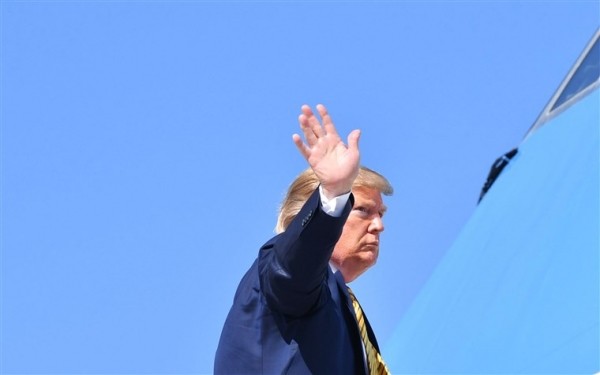Can a president really say or promise anything he wants when conducting foreign policy?
Analysis: "The president [has] the authority to do, and say, and pledge, awful things in the conduct of U.S. foreign policy," said a Bush admin lawyer.

President Donald Trump boards Air Force in Mountain View, California, on Sept. 17, 2019.Nicholas Kamm / AFP – Getty Images
WASHINGTON — If a secret whistleblower complaint covers President Donald Trump’s dealings with the president of Ukraine, as two major newspapers have reported, it raises profound constitutional questions about whether Congress can police the president’s conversations with foreign leaders, legal experts say.
A former intelligence official familiar with the matter tells NBC News the complaint concerns a Trump phone call. The Washington Post has reported that it involves a promise by Trump centering on Ukraine. The New York Times has also reported that the complaint deals in part with Ukraine.
Much remains unclear. But the reporting on Ukraine has led analysts to focus on a phone call that is already in the news, one that occurred two and a half weeks before the complaint was filed in August.
In that call, Trump spoke with Ukrainian President Volodymyr Zelensky. Even before the whistleblower complaint became known, House Democrats were investigating whether Trump and his lawyer, Rudolph Giuliani, tried to pressure the Ukrainian government into helping Trump’s reelection campaign by re-opening an investigation involving Democratic candidate Joe Biden.
Lawmakers from several committees have demanded a transcript of the call.
Whistleblower complaint about Trump involves Ukraine, report says
Sept. 20, 201902:02
If the complaint by the intelligence official is about something Trump said on that call, that would go a long way toward explaining the legal disagreement over whether the whistleblower complaint should be turned over to the Congressional intelligence oversight committees.
What it comes down to, it appears, is that the Justice Department and the acting director of national intelligence are arguing that what Trump did, however inappropriate, did not involve “an intelligence activity of the United States,” and therefore does not fall under the jurisdiction of the intelligence committees.
This argument would make some sense if the allegation is that Trump improperly sought to pressure a foreign leader for personal gain — in other words, that he used the awesome power of the U.S. presidency in an effort to target his political opponent.
If Trump didn’t specifically promise to use intelligence agencies or capabilities to help or hurt Ukraine — and instead talked about military aid, for example — the lawyers may have concluded that the complaint did NOT cover an intelligence activity protected by the Intelligence Community Whistleblowers Protection Act.
Some legal scholars, such as Harvard’s Jack Goldsmith, are making an even broader argument: that the president can say and do anything he wants in the conduct of foreign relations, which is purely an executive branch function.
“Putting it brutally, Article II gives the president the authority to do, and say, and pledge, awful things in the secret conduct of U.S. foreign policy,” Goldsmith, a former Bush Administration lawyer, said on Twitter. “That is a very dangerous discretion, to be sure, but has long been thought worth it on balance.”
Those arguing the other side say: Not if what Trump was doing was for his own personal interests, rather than on behalf of the United States.
“If Trump was trying to abuse his power of the presidency to solicit foreign help for his campaign, it’s hard to imagine a more impeachable offense,” tweeted Ben Rhodes, a former national security adviser to President Obama and an NBC News contributor.
The inspector general for the intelligence community, Michael Atkinson, contends that the complaint MUST be turned over to the intelligence committees. In a carefully worded letter explaining his position, he writes, “The Complainant’s disclosure not only falls within the DNI’s jurisdiction, but relates to one of the most significant and important of the DNI’s responsibilities to the American people.”
Viewed in the context of the Trump-Ukraine allegation, that line could be a reference to the DNI’s responsibility to preserve and defend the Constitution and uphold the rule of law.
The upshot is that the debate over whether the complaint must be turned over to the Congressional intelligence committees is a narrow one, and not the whole story. It may well be that as a legal matter, this complaint doesn’t properly fall under the jurisdiction of the intelligence committees. If Schiff takes this to court, he may not win.
The larger question, scholars say, is: Trump did something improper in negotiating with a foreign leader, does Congress have a right to learn about it, and conduct oversight? If so, how? If not the intelligence committees, who has a right to learn about this and investigate?
